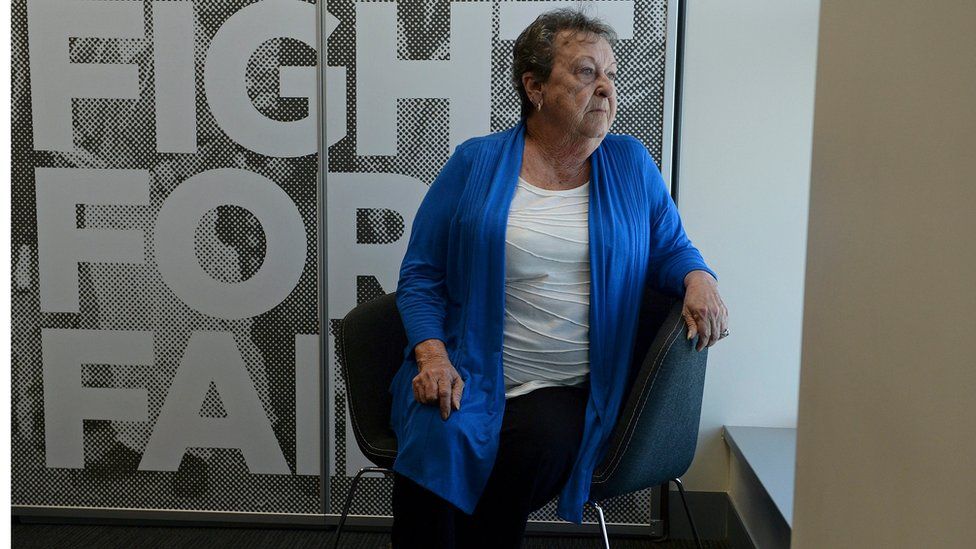Yvonne D'Arcy: The Australian grandmother who won gene patent battle
- Published

Yvonne D'Arcy, who has won a landmark court case against the patenting of a cancer gene, is an Australian grandmother and has twice survived cancer.
Victory in Australia's High Court was the culmination of a long battle for the Brisbane woman, twice, who has been diagnosed with breast cancer herself.
In an interview with Australia's ABC, she said the pain of chemotherapy was what motivated her to begin her campaign.
"I have met a lot of women with genetic cancer and if I can help them in any way stop having to have chemo and radiation therapy then I will have done my job," she told the network.
Long fight
Ms D'Arcy's involvement began in 2010 when the social justice practice of legal firm Maurice Blackburn took up the case on her behalf - the start of a five-year legal battle in the face of long odds.
In February 2013, Justice Nicholas of the Federal Court ruled that Myriad Genetics patent was valid, as the act of isolating the gene mutation made it a human invention.
Upset and unwilling to accept the verdict, Ms D'Arcy and campaign group Cancer Voices Australia, lodged an appeal.
She was given hope by a landmark ruling in the US Supreme Court in June of the same year, which rejected patenting of the gene, with similar reasoning to that which would eventually prevail in Australia.
But the optimism was short-lived, because in February 2014 the Full Federal Court again backed Myriad Genetics' patent in Australia.
Refusing to end her campaign, she was later given permission to take the case to the country's highest court, which began hearing it in June this year.
Her legal battle finally ended in success on Wednesday, when those earlier judgements were dramatically reversed in a unanimous High Court verdict against Myriad Genetics' patent.
'David and Goliath'
Ms D'Arcy was predictably delighted.
"I screamed. I was just excited to know that we had it seven-nil our way," the 69-year-old said, adding that she expected testing to become cheaper as a result.
Ms D'Arcy admitted the fight was "a David and Goliath test".
"I'm only a little person, but it's not the size of the dog in the fight, it's the size of the fight in the dog."
US firm Myriad Genetics had previously patented the BRCA1 gene, detection of which helps diagnose certain cancers, particularly ovarian and breast cancer.
Ms D'Arcy did not carry that genetic marker for her own cancer.
Myriad Genetics had argued the nucleic acid they had isolated was distinct from the DNA as found in nature, and so could be patented. But the court concluded that while human activity was required to isolate the gene, that was insufficient to make it a manufactured product.
Cancer campaigners welcomed the result.
Paul Grogan, head of public policy at Cancer Council Australia, admitted that the case was "more about the principle", as the BRCA1 patent itself was due to expire soon.
The verdict, he said, would hopefully "provide enough clarity for lawmakers" that patents are not issued for purely diagnostic tests, "so we won't have to see them disputed in court in future".
This, he hoped, would encourage new such tests, with researchers no longer having to worry about infringing a patent issued on a particular gene.
Women that carry the BRCA1 mutation are much more likely to develop breast and ovarian cancer than those without.
The protein helps to repair damaged DNA strands, or tags those that cannot be repaired for destruction. But mutations in it can stop it from repairing damaged DNA, allowing them to create a tumour.
Despite holding it, Myriad Genetics never enforced its genetic patent in Australia.
In 2008 it granted an exclusive licence to the patent to an Australian company Genetic Technologies Limited, which initially tried to enforce it, before backing down in the face of widespread negative publicity.
The World Heath Organisation estimates that breast cancer kills around 458,000 people every year.=
- Published7 October 2015
- Published19 September 2014
- Published14 May 2013
- Published24 March 2015